You Never Had a Bad Meal and You Never Again Heard the Truth
Is breakfast really the most important meal of the day?
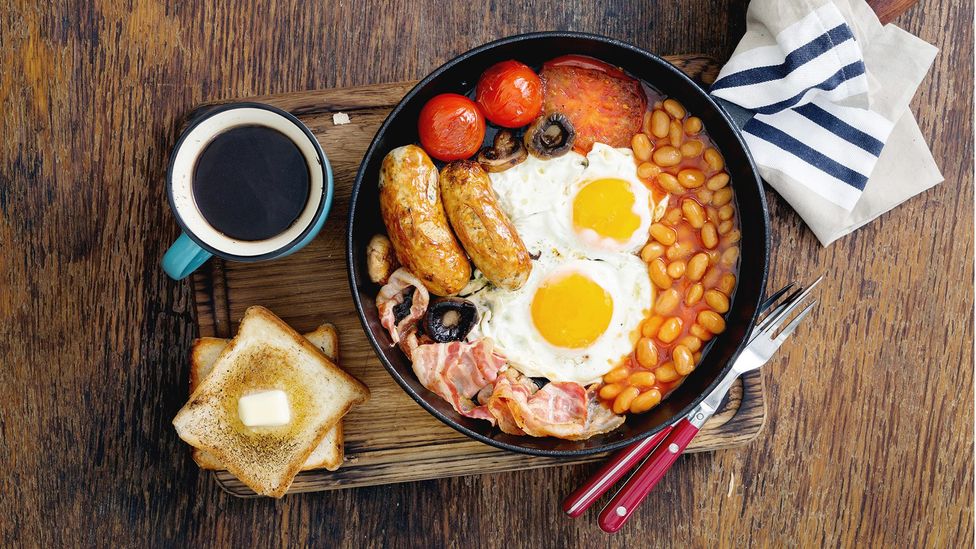
Nosotros've all heard that healthier, fitter people don't skip breakfast. But does that mean breakfast makes us healthier and thinner – or is information technology something else?
A
Along with onetime classics like 'carrots give you night vision' and 'Santa doesn't bring toys to misbehaving children', one of the nearly well-worn phrases in the arsenal of tired parents everywhere is that breakfast is the most important repast of the day. Many of us grow upward believing that skipping breakfast is a dietary travesty – even if only two thirds of adults in the UK eat breakfast regularly, co-ordinate to the Association of United kingdom of great britain and northern ireland Dieticians (BDA), and around 3-quarters of Americans.
The clue for why breakfast is supposed to be important is in its name: we're advised to eat it to break our overnight fast.
"The torso uses a lot of free energy stores for growth and repair through the dark," explains dietician Sarah Elder. "Eating a counterbalanced breakfast helps to up our energy, equally well as protein and calcium used throughout the night."

It'southward true that eating a balanced breakfast helps restore our free energy after a night's fast (Credit: Getty)
But at that place's widespread disagreement over whether breakfast should keep its top spot in the hierarchy of meals. As well equally the rising popularity of fasting diets, in that location have been concerns around the carbohydrate content of cereal and the food industry's involvement in pro-breakfast research – and even one claim from an bookish that breakfast is "unsafe".
So what'south the reality? Is breakfast a necessary start to the day… or a marketing ploy by cereal companies?
You might also similar:
• Is sugar really bad for you?
• We don't need most every bit much protein every bit we consume
• Is having a low-table salt diet as unhealthy as likewise much?
Weighty decision
The almost researched aspect of breakfast (and breakfast-skipping) has been its links to obesity. Scientists take dissimilar theories as to why at that place's a relationship between the ii.
In ane US study that analysed the health data of l,000 people over seven years, researchers found that those who made breakfast the largest meal of the 24-hour interval were more likely to have a lower body mass alphabetize (BMI) than those who ate a large tiffin or dinner. The researchers argued that breakfast helps increase satiety, reduce daily calorie intake, improve the quality of our nutrition – since breakfast foods are oftentimes college in fibre and nutrients – and improve insulin sensitivity at subsequent meals, which can be a adventure for diabetes.

One analysis found that people who made breakfast the biggest meal were more probable to take a lower body mass alphabetize (Credit: Getty)
Only as with any written report of this kind, information technology was unclear if that was the crusade – or if breakfast-skippers were simply more probable to be overweight to brainstorm with.
To find out, researchers designed a study in which 52 obese women took part in a 12-week weight loss program. All had the same number of calories over the twenty-four hours, but half had breakfast, while the other half did non.
What they establish was that information technology wasn't breakfast itself that caused the participants to lose weight: it was changing their normal routine. The women who said before the study that they ordinarily ate breakfast lost viii.9kg when they stopped having breakfast, compared to 6.2kg in the breakfast group. Meanwhile, those who ordinarily skipped breakfast lost 7.7kg when they started eating it – and 6kg when they connected to skip it.

People who swallow breakfast may just exist more than health-conscious overall – rather than breakfast making them healthier (Credit: Getty)
If breakfast alone isn't a guarantee of weight loss, why is there a link between obesity and skipping breakfast?
Alexandra Johnstone, professor of appetite enquiry at the Academy of Aberdeen, argues that it may only be considering breakfast-skippers take been establish to be less knowledgeable nearly diet and health.
"There are a lot of studies on the relationship between breakfast eating and possible health outcomes, simply this may be because those who eat breakfast choose to habitually have health-enhancing behaviours such every bit not smoking and regular exercise," she says.
A 2016 review of 10 studies looking into the relationship between breakfast and weight direction concluded in that location is "limited prove" supporting or refuting the argument that breakfast influences weight or food intake, and more evidence is required before breakfast recommendations can exist used to aid prevent obesity.
Feast or fast?
Intermittent fasting, which involves fasting overnight and into the next day, is gaining ground among those looking to lose or maintain their weight or improve their health.

Skipping breakfast – past only eating between ix:00 and 15:00 – was found to exist benign in 1 small written report (Credit: Getty)
One pilot study published in 2018, for example, found that intermittent fasting improves blood saccharide command and insulin sensitivity and lowers blood force per unit area. Eight men with pre-diabetes were assigned ane of ii eating schedules: either eating all their calories between 9:00 and 15:00, or eating the same number of calories over 12 hours. The results for the 9:00-fifteen:00 group were found to exist on par with medicine that lowers blood pressure, according to Courtney Peterson, the written report'due south writer and assistant professor of nutrition sciences at the University of Alabama at Birmingham.
Still, the study'due south small size means more inquiry is needed on its possible long-term benefits.
If skipping breakfast (and other food outside of a restricted time slot) could potentially be healthy, does that hateful breakfast could be bad for you? One academic has said and then, arguing that breakfast is 'dangerous': eating early in the day causes our cortisol to peak more than it does afterwards on. This causes the trunk to become resistant to insulin over time and tin lead to type ii diabetes.
Simply Fredrik Karpe, professor of metabolic medicine at Oxford Centre for Diabetes, Endocrinology and Metabolism, argues this isn't the case. Instead, higher levels of cortisol in the forenoon are but part of our body's natural rhythm.
Not just that, just breakfast is fundamental to jumpstarting our metabolism, he says. "In gild for other tissues to respond well to nutrient intake, you demand an initial trigger involving carbs responding to insulin. Breakfast is critical for this to happen," Karpe says.
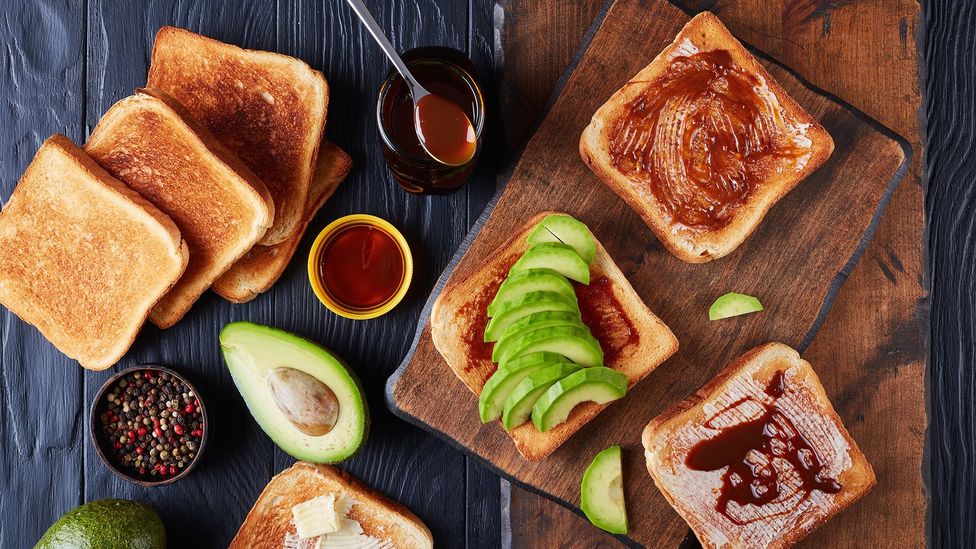
An initial 'trigger' with carbohydrates is disquisitional for jumpstarting the metabolism (Credit: Getty)
A randomised control trial published last year involving eighteen people with, and 18 people without, diabetes plant that skipping breakfast disrupted the circadian rhythms of both groups and led to larger spikes in blood glucose levels after eating. Eating breakfast, the researchers conclude, is essential for keeping our body clock running on fourth dimension.
Peterson says those who skip breakfast can be divided into those who either skip breakfast and eat dinner at a normal time – getting the benefits of intermittent fasting, if not breakfast – or those who skip breakfast and eat dinner belatedly.
"For those who eat dinner subsequently, their hazard of obesity, diabetes and cardiovascular disease goes through the roof. While it seems breakfast is the most important repast of the solar day, it might actually be dinner," she says.
"Our blood sugar control is best early on in the mean solar day. When nosotros eat dinner belatedly, that's when we're nearly vulnerable because our blood sugar is worst. There'southward more inquiry to exercise, simply I'1000 confident you shouldn't skip breakfast and accept dinner late."

Considering blood sugar control is best in the morning, it'southward better to accept a big meal early in the day – not tardily at night (Credit: Getty)
She says we should recollect of our circadian rhythm as an orchestra.
"There are ii parts of our circadian clock. In that location's the primary clock in the encephalon, which we should call up of equally coordinating to a conductor of an orchestra, and the other half is in every organ, which has a separate clock," she says.
And that 'orchestra' is prepare by two outside factors: brilliant light exposure and our eating schedule.
"If yous're eating when you're non getting vivid calorie-free exposure, the clocks that control metabolism are in dissimilar time zones, creating conflicting signals as to whether to rev up or down."

A bigger breakfast may help with weight control (Credit: Getty)
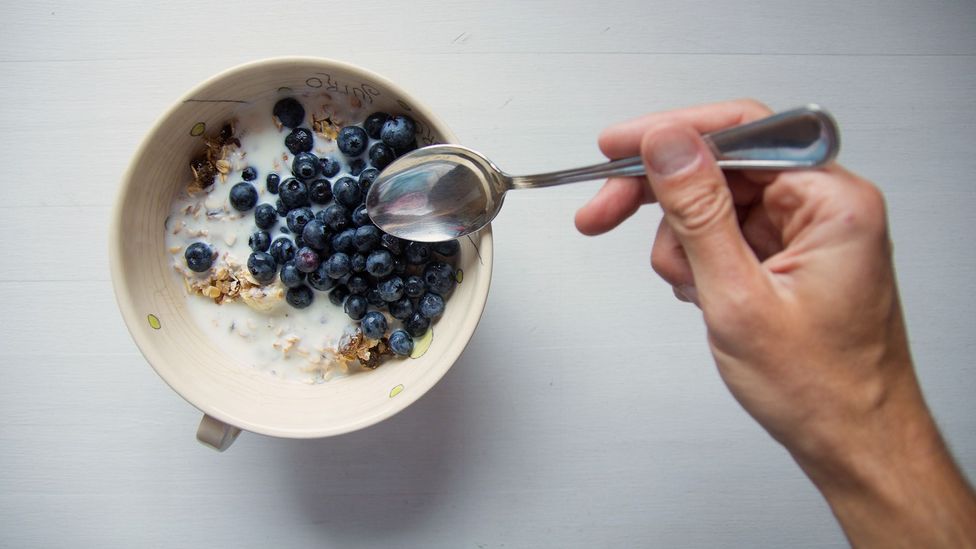
Because many cereals are fortified with vitamins, breakfast-eaters often take in more nutrients… only likewise more sugar (Credit: Getty)
One reason may be breakfast's nutritional value – partly because cereal is fortified with vitamins. In one study on the breakfast habits of 1,600 immature people in the Uk, researchers constitute that the fibre and micronutrient intake, including of folate, vitamin C fe and calcium, was meliorate in those who had breakfast regularly. There have been similar findings in Australia, Brazil, Canada and the United states of america.
Breakfast is also associated with improved brain function, including concentration and language. A review of 54 studies found that eating breakfast can improve retentiveness, though the effects on other encephalon functions were inconclusive. However, one of the review's researchers, Mary Beth Spitznagel, says in that location is "reasonable" evidence breakfast does meliorate concentration – there but needs to be more research.

Eating breakfast may help to amend memory (Credit: Getty)
"Looking at studies that tested concentration, the number of studies showing a benefit was exactly the aforementioned as the number that found no do good," she says.
"And no studies found that eating breakfast was bad for concentration."
What'south almost important, some argue, is what we eat for breakfast.
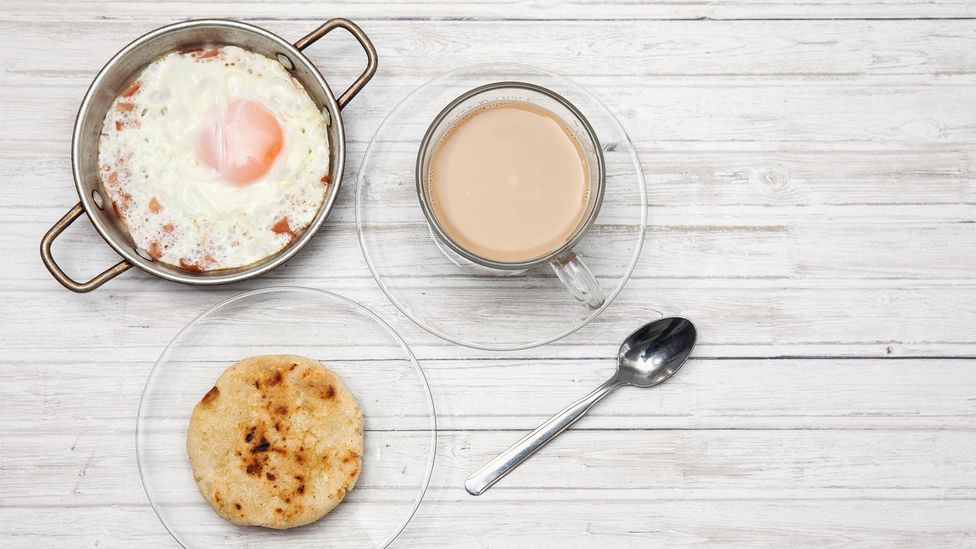
High-protein breakfasts help reduce food cravings later in the day (Credit: Getty)
High-poly peptide breakfasts accept been found particularly effective in reducing food cravings and consumption subsequently in the day, according to inquiry by the Australian Commonwealth Scientific and Industrial Research Organisation.
While cereal remains a firm favourite among breakfast consumers in the U.k. and Us, a recent Which? investigation into the sugar content of 'adult' breakfast cereals found that some cereals contain more three quarters of the recommended daily amount of costless sugars in each portion, and carbohydrate was the 2nd or third highest ingredient in seven out of x flaked cereals.
But some inquiry suggests if we're going to eat sugary foods, information technology's best to practise information technology early. One study plant that irresolute levels of the appetite hormone leptin in the body throughout the twenty-four hour period coincide with having our lowest threshold for sweet nutrient in a forenoon, while scientists from Tel Aviv University take plant that hunger is best regulated in the morning. They recruited 200 obese adults to take function in a sixteen-week-long nutrition, where one-half added dessert to their breakfast, and half didn't. Those who added dessert lost an average of 40lbs (18kg) more – however, the study was unable to show the long-term effects.
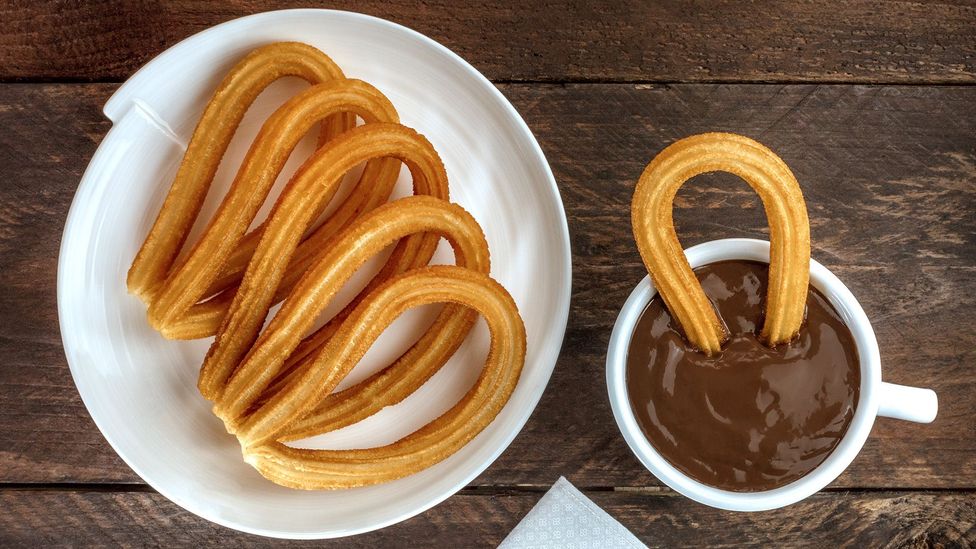
Research suggests that if we're going to swallow sugariness foods, breakfast is the best fourth dimension to do and then (Credit: Getty)
A review of 54 studies found that there is no consensus yet on what type of breakfast is healthier, and conclude that the blazon of breakfast doesn't matter as much equally simply eating something.
Final take
While there's no conclusive prove on exactly what nosotros should be eating and when, the consensus is that we should listen to our own bodies and eat when nosotros're hungry.
"Breakfast is most important for people who are hungry when they wake upwardly," Johnstone says.
For instance, research shows that those with pre-diabetes and diabetes may find they have meliorate concentration afterwards a lower-GI breakfast such every bit porridge, which is broken down more slowly and causes a more gradual ascent in blood carbohydrate levels.

Low-GI breakfasts like porridge (or Ghanaian fufu, fabricated from ground plantains and cassava) may be better for those with diabetes (Credit: Getty)
Every trunk starts the day differently – and those individual differences, particularly in glucose function, need to exist researched more closely, Spitznagel says.
In the stop, the cardinal may exist to be mindful of not over-emphasising any unmarried meal, simply rather looking at how we eat all 24-hour interval long.
"A balanced breakfast is really helpful, but getting regular meals throughout the day is more important to go out blood sugar stable through twenty-four hours, that helps control weight and hunger levels," says Elder.
"Breakfast isn't the only meal nosotros should be getting right."
Join 900,000+ Future fans past liking us on Facebook , or follow us on Twitter or Instagram .
If y'all liked this story, sign upwardly for the weekly bbc.com features newsletter , called "If Yous Only Read 6 Things This Week". A handpicked selection of stories from BBC Future, Culture, Uppercase, and Travel, delivered to your inbox every Friday.
pearsoncauseveras1954.blogspot.com
Source: https://www.bbc.com/future/article/20181126-is-breakfast-good-for-your-health
0 Response to "You Never Had a Bad Meal and You Never Again Heard the Truth"
Post a Comment